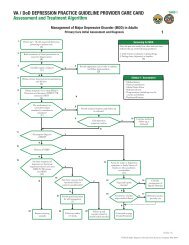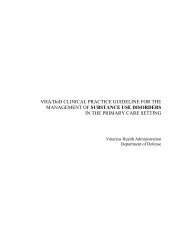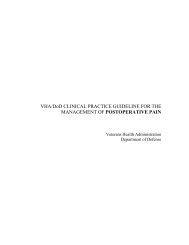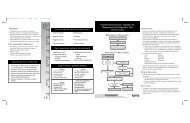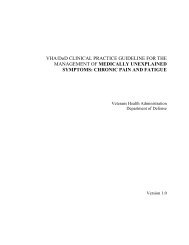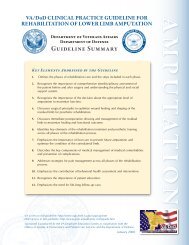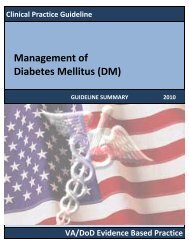DM Full Guideline (2010) - VA/DoD Clinical Practice Guidelines Home
DM Full Guideline (2010) - VA/DoD Clinical Practice Guidelines Home
DM Full Guideline (2010) - VA/DoD Clinical Practice Guidelines Home
You also want an ePaper? Increase the reach of your titles
YUMPU automatically turns print PDFs into web optimized ePapers that Google loves.
Version 4.0<br />
DISCUSSION<br />
<strong>VA</strong>/<strong>DoD</strong> <strong>Clinical</strong> <strong>Practice</strong> <strong>Guideline</strong><br />
for the Management of Diabetes Mellitus<br />
There is evidence in patients with diabetes that both duration and severity of hyperglycemia increase risk for<br />
microvascular and perhaps macrovascular complications (UKPDS 1998, DCCT, 1993). Up to 20-50% of patients<br />
with newly diagnosed with <strong>DM</strong> have microvascular disease (UKPDS, 1998). Treatment of hyperglycemia reduces<br />
the increased risk of complications (DCCT, 1993; UKPDS-33, DCCT/EDIC). However, treatment of pre-diabetes,<br />
which may delay the diagnosis of diabetes, has not been shown to affect microvascular or macrovascular disease.<br />
The diagnosis of pre-diabetes and <strong>DM</strong> are, by convention, dichotomous but risks associated with hyperglycemia are<br />
continuous.<br />
There is evidence from the DPP (Knowler et al., 2002) that persons with pre-diabetes who participate in intensive<br />
lifestyle modification including regular aerobic exercise and calorie-restricted diet and achieve a sustained weight<br />
loss, develop <strong>DM</strong> at a lower rate than untreated individuals. In addition, a meta-analysis (Yamaoka & Tango, 2005)<br />
showed that in patients with pre-diabetes, education in lifestyle modifications reduces progression to diabetes by<br />
50%. Collectively, these observations suggest that treatment of pre-diabetes may prevent the complications of<br />
diabetes.<br />
Two high quality RCTs addressed the impact of weight loss/exercise on the development of type 2 <strong>DM</strong> in adults<br />
with IGT (Swinburn et al., 2001; Tuomilehto et al., 2001). Both studies concluded that diet and/or exercise, as<br />
compared to placebo, delayed the onset of diabetes in patients with glucose intolerance. In addition, Knowler et al.<br />
(2002) found that diet and exercise were significantly more effective than metformin in prevention of diabetes in<br />
glucose intolerant patients.<br />
Two lower quality RCTs also showed that diet and/or exercise will delay the onset of diabetes in glucose-impaired<br />
individuals (Knowler et al., 2002; Pan et al., 1997).<br />
While lifestyle modifications are preferred, many patients will either not respond or have only initial success. In<br />
these patients, the use of pharmacologic agents could be considered. A series of agents have been studied – alphaglucosidase<br />
inhibitors, metformin, thiazolidinediones; and in hypertensive patients, angiotensin converting enzyme<br />
inhibitors and angiotensin receptor blockers. Each has been shown to delay progression from pre-diabetes to<br />
diabetes. There are no data that suggest that the selection of one agent is preferred over another. None have been<br />
shown to reduce long-term complications of diabetes and none have FDA indications for this use. While the<br />
thiazolidinediones have been shown to delay diabetes, they are not recommended because of concerns over their<br />
long-term safety data and side effects associated with their use.<br />
EVIDENCE<br />
Recommendation Sources LE QE SR<br />
1 Weight loss and exercise counseling Yamaoka and Tango, 2005 I Good A<br />
of patients with FPG >100.<br />
2 Diet and exercise leading to weight<br />
loss may slow progression to<br />
diabetes.<br />
Knowler et al., 2002<br />
Tuomilehto et al., 2001<br />
Pan et al., 1997<br />
Gillies et al., 2007<br />
I Good A<br />
3 Weight loss for patients with a BMI<br />
>25 or those with other risk<br />
factors for diabetes<br />
4 Lifestyle modification for patients<br />
with other risk factors.<br />
5 Pharmacologic therapy delays<br />
progression to the diagnosis of<br />
diabetes<br />
Knowler et al., 2002<br />
Swinburn et al., 2001<br />
Tuomilehto et al., 2001<br />
Pan et al., 1997<br />
Field et al., 2001<br />
Manson et al., 1992<br />
Chiasson et al., 2006<br />
Gillespie et al., 2005<br />
Scheen et al., 2004<br />
Padwal et al., 2005<br />
Van de Laar et al., 2006<br />
Salpeter et al., 2008<br />
LE-Level of Evidence; QE = Quality of Evidence; SR = Strength of Recommendation (see Appendix A)<br />
I Good A<br />
II-2 Fair B<br />
I Good A<br />
Module S: Screening for Diabetes Page 38







